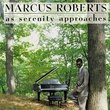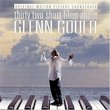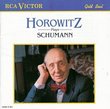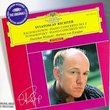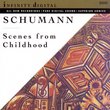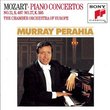| All Artists: Beethoven, Toscanini, NBC Title: Beethoven: 9 Symphonies/Leonore Overture No. 3 (Volumes 1-5) Members Wishing: 0 Total Copies: 0 Label: RCA Release Date: 5/25/1990 Genre: Classical Styles: Historical Periods, Classical (c.1770-1830), Modern, 20th, & 21st Century, Symphonies Number of Discs: 5 SwapaCD Credits: 5 UPC: 090266032426 |
Search - Beethoven, Toscanini, NBC :: Beethoven: 9 Symphonies/Leonore Overture No. 3 (Volumes 1-5)
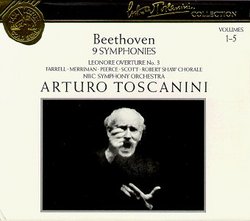 | Beethoven, Toscanini, NBC Beethoven: 9 Symphonies/Leonore Overture No. 3 (Volumes 1-5) Genre: Classical
Compiled on five discs, these readings represent Arturo Toscanini's last thoughts on the Beethoven symphonies, recorded when he was in his mid-80s. They are taut, energetic, cohesive performances, and utterly distinctive i... more » |
Larger Image |
CD DetailsSynopsis
Amazon.com essential recording Compiled on five discs, these readings represent Arturo Toscanini's last thoughts on the Beethoven symphonies, recorded when he was in his mid-80s. They are taut, energetic, cohesive performances, and utterly distinctive in their balance of lyricism and dynamism. The NBC Symphony was not the greatest orchestra then, or ever; despite the legend that grew up around it, there are places where one can hardly help noticing the problems with tuning in the winds, the frayed string ensemble, the less-than-ideal tone in the brass. But these recordings capture an orchestra playing with absolute commitment, and one that had been superbly well rehearsed at that. With Toscanini, the music is always moving toward something. The sense of impetus in these accounts is truly remarkable, whether it expresses itself merely as a surging forward, or as an electrifying, headlong rush to the finish. The scherzo of "The Eroica" is wonderfully fleet and vibrant, the storm in the Pastorale violently powerful, the opening Allegro of the Second impetuous, brilliant, almost fierce. The whole of the Seventh Symphony is explosive, though the ensemble in the scherzo is not especially good. These are all studio recordings made in Carnegie Hall, except for Nos. 4 and 5, which are broadcast transcriptions (and noisier as a result), and No. 7, which is a hybrid. The sound, thanks to excellent remastering, has remarkable impact and clarity, with full dynamic range, good detail, and no evidence of the egregious processing that marred so many earlier incarnations of these readings. --Ted Libbey Similarly Requested CDs
|
CD ReviewsThe definitive Beethoven 07/02/1999 (5 out of 5 stars) "Beethoven's symphonies are the benchmark of the classical repertoire. Nothing has that often been tried, nothing has that often been failed. Not the man himself, Arturo Toscanini. This is definately the definite Beethoven. It is a masterpiece of interpretation of these masterworks, never achieved again and probably not to be achieved in the future. Highest recommendation for these CD's. Everybody who at least loves music a little bit shoul not be without this wonderful set. In case you don't believe me, ask the famous German critic Jürgen Gahre." Only Toscanini and Karajan came close... madamemusico | Cincinnati, Ohio USA | 10/14/2000 (4 out of 5 stars) "Many, many conductors have recorded the Beethoven Nine, but only two have come close in a complete "cycle," Toscanini and Karajan. This was/is Toscanini's only "approved" integral set of the Nine. Karajan made four, one with the Philharmonia and three with the Berlin Philharmonic. My overall favorite Karajan set is the third (second with Berlin), made in 1974-76, though his later Fifth is better-played.Anyway, to return to Toscanini...this set is very, very good. It was made better than earlier when, for this issue, the technically shoddy 1953 "Eroica" was replaced by the superior 1949 recording. Yet there are two readings here that are, if not poor, rather weak, the Fifth and the Ninth. This Fifth strives for a rugged, "structural" reading, yet it is not quite powerful OR lyrical enough, whereas Karajan's 1983 Fifth is a masterpiece on both counts. Likewise, this Ninth--though well-played by its own standards--lacks much of the fire and forward momentum of his earlier versions; and, in the last movement, the solo singers actually sound awkward as they try to negotiate their a capella passage near the end.But this doesn't mean that Toscanini is not the conductor to hear for great performances of all nine symphonies--far from it! He's just not at his best in all of THESE performances. My recommendation is to buy the newly-remastered versions of Symphonies 1-4 ("Immortal Toscanini," Vol. I), the New York Philharmonic versions of Symphonies 5 & 7 (on Magic Talent), the BBC Symphony versions of Symphonies 4 & 6, the single disc from this set with Symphonies 5 & 8, and the Grammofono reissue of his 1939 Beethoven Ninth. This will give you all nine symphonies on 6 CDs instead of 5, unfortunately, but you will be pleased with what you hear. And, if you want a more modern-sounding Ninth, there's always the late Karajan versions (both the 1976 and 1984 recordings are excellent)." Beethoven, as Only Toscanini Could Play Him D. J. Zabriskie | Park Ridge, NJ USA | 03/31/2002 (4 out of 5 stars) "While this may not be a definitive reading of Beethoven's
9 symphonies (there were always problems with the NBC Symphony), it is, nevertheless, a benchmark collection, a touchstone by which to compare all other readings. This collection gives the listener an excellent idea of what Toscanini is all about; even if his take on Beethoven is not everybody's cup of tea. If you want more sumptutious sonorities, go to Karajan; if you want more romanticism go to Bernstein. Solti probablyrecorded a better set than any of these, but the virtues of a Toscanini performance are evident throughout these recordings. And what virtues they are! Toscanini's propulsive rythymic momentum is a marvel to behold and always gives the listener a sense of "purpose" and direction to the music. His reading of the Seventh, despite some gaffes by the orchestra, may be the best recording of that symphony extant! Listen to the clarity of the orchestral textures: how each section ofthe orchestra shines on its own, bringing out the inner voices as no subsequent recording has done, and how these sections blend so marvelously into a whole which retains clarity and definition! If you need more beer and brown gravy with your Beethoven, fine! You won't get it here... just the extraordinary revelation of all the little goodies to be found in Beethoven's symphonies, if you study the scores carefully and play them with rigor and taste!" |

 Track Listings (8) - Disc #1
Track Listings (8) - Disc #1
